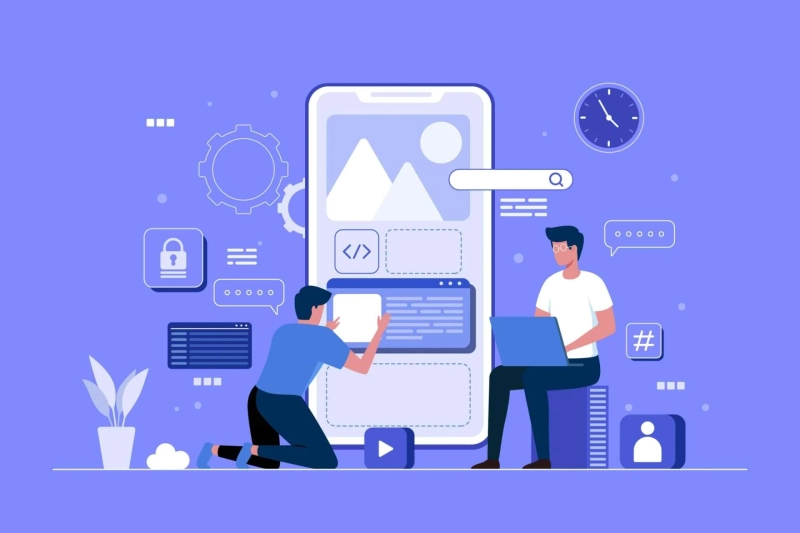Dive into the world of app development and bring your ideas to life with this insightful exploration of turning concepts into digital reality.
In today's digital age, where smartphones have become an integral part of our lives, app development has emerged as a lucrative and exciting field. Mobile apps have revolutionized various industries and provided solutions to everyday challenges.
Understanding the App Development Process
Defining the Idea
The first step in app development is to define a compelling idea. Brainstorm unique features, functionalities, and the problem your app aims to solve. Consider market demand and target audience preferences during this stage.
Researching the Market
Conduct thorough market research to understand the competition, target audience demographics, and trends. Analyze similar apps to identify gaps and areas for improvement. This research will help you refine your idea and make it stand out in the crowded app market.
Creating a Wireframe
A wireframe is a visual representation of your app's layout and navigation. It serves as a blueprint that outlines the app's structure, content, and user flow. Use wireframing tools to create a basic prototype and iterate upon it until you're satisfied with the user experience.
Designing the User Interface
A visually appealing and intuitive user interface (UI) is crucial for the success of your app. Collaborate with a professional UI designer to create visually engaging screens, icons, and animations. Focus on consistency, readability, and ease of use.
Developing the Backend
The backend development involves building the server, database, and APIs that power your app's functionality. Choose a suitable programming language and framework for your app's backend, considering factors such as scalability, security, and integration with third-party services.
Choosing the Right App Development Platform
There are different app development platforms available, each with its own advantages and considerations. Understanding these options will help you choose the right platform for your app.
Native App Development
Native app development involves building separate apps for different platforms, such as iOS and Android. This approach offers better performance and access to platform-specific features but requires more development time and resources.
Cross-Platform App Development
Cross-platform app development allows you to build a single app that works across multiple platforms. It offers faster development and cost savings, but may have limitations in terms of performance and access to native features.
Hybrid App Development
Hybrid app development combines elements of native and web apps. It uses web technologies such as HTML, CSS, and JavaScript wrapped within a native container. Hybrid apps offer faster development cycles and easy maintenance but may not provide the same level of performance as native apps.
Key Considerations for Successful App Development
When developing an app, several key considerations can significantly impact its success. Pay attention to the following aspects to ensure a high-quality app that meets user expectations.
User Experience (UX) Design
Aim to provide a seamless and intuitive user experience. Prioritize simplicity, easy navigation, and clear visual cues. Conduct user testing and gather feedback to refine your app's UX.
Performance and Scalability
Optimize your app for speed and responsiveness. Ensure it can handle a large number of users and data without performance degradation. Regularly optimize code, reduce network requests, and consider server scalability.
Security and Privacy
Implement robust security measures to protect user data and prevent unauthorized access. Use encryption, secure authentication methods, and follow best practices for data handling and storage.
Integration with Third-Party Services
Integrate your app with popular third-party services to enhance its functionality. Utilize APIs for features like social media sharing, payment gateways, and location services. Ensure seamless integration and test thoroughly.
Tools and Technologies for App Development
The app development process relies on various tools and technologies that facilitate efficient development and enhance the app's functionality and performance.
Programming Languages
Choose the right programming language for your app's frontend and backend development. Popular choices include Swift and Objective-C for iOS, Java and Kotlin for Android, and JavaScript for web-based and hybrid apps.
Integrated Development Environments (IDEs)
IDEs provide a comprehensive environment for app development, offering features like code editing, debugging, and testing. Examples include Xcode for iOS, Android Studio for Android, and Visual Studio Code for cross-platform development.
Software Development Kits (SDKs)
SDKs provide libraries, tools, and documentation to simplify app development. They offer access to platform-specific features, such as camera functionality, push notifications, and in-app purchases.
App Analytics and Testing Tools
Utilize app analytics tools to gain insights into user behavior, retention rates, and app performance. Testing tools such as TestFlight for iOS and Firebase Test Lab for Android help identify bugs and ensure app stability across devices.
Conclusion
App development offers endless possibilities for turning ideas into reality. By following a systematic approach, leveraging the right tools and technologies, and considering user experience, security, and monetization strategies, you can create successful and engaging mobile apps. Stay updated with the latest trends and embrace emerging technologies to stay ahead in the dynamic world of app development.
Frequently Asked Questions (FAQs)
Q: How long does it take to develop a mobile app?
A: The development time can vary depending on the complexity of the app and the team's experience. Simple apps can be developed in a few weeks, while complex apps may take several months or more.
Q: Is app development expensive?
A: The cost of app development depends on factors like app complexity, features, platform, and team rates. It's essential to plan and budget accordingly.
Q: Can I create an app without coding skills?
A: Yes, there are no-code and low-code app development platforms available that allow you to create basic apps without coding. However, coding skills are beneficial for more advanced customization and functionality.
Q: How can I protect my app idea?
A: To protect your app idea, consider signing a non-disclosure agreement (NDA) with collaborators or seeking legal advice for patents or trademarks if necessary.


